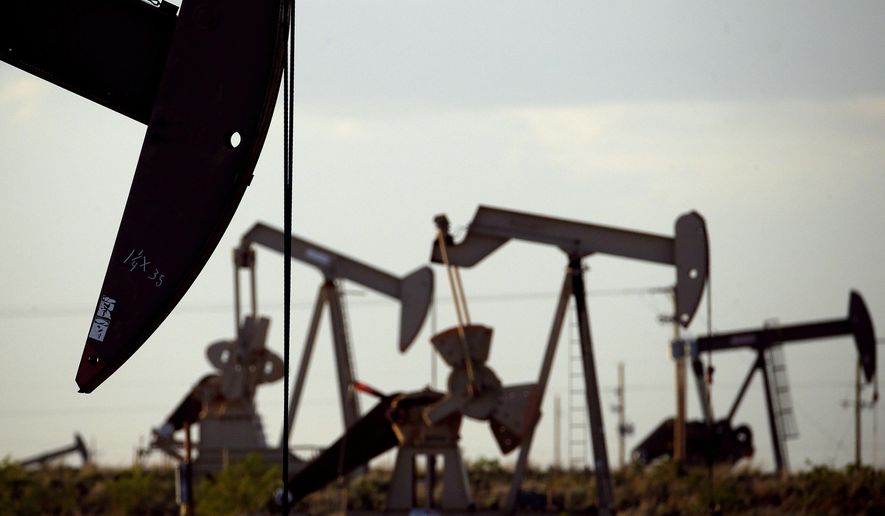ALBUQUERQUE, N.M. (AP) - Local officials and residents in New Mexico’s oil patches are anxious as the Biden administration takes aim at the oil and natural gas industry with a series of new executive orders. But the state’s two U.S. senators are supporting the actions, saying it’s time to rethink the nation’s energy policies.
Democrat Sen. Martin Heinrich said he would not support a permanent, unilateral ban on new oil and gas leases but he believes a pause is appropriate despite concerns from industry groups and others that doing so could have immediate implications for the state’s bottom line.
“It’s also crystal clear that the zero carbon, zero pollution economy is coming,” Heinrich told The Associated Press. “Even oil and gas majors are planning for that future. To weather that change, New Mexico needs a transition plan with a predictable glide path for producers and robust investments in the communities where our energy veterans have produced our country’s transportation fuels.”
President Joe Biden aims to cut oil and gas emissions and double energy production from offshore wind turbines. He’s also directing agencies to focus investments on regions that face job losses as the U.S. begins to shift toward wind, solar and other resources.
The Biden administration last week also suspended for 60 days the regulatory authority of federal land managers in field offices across the country, meaning any decisions regarding leasing, permitting or other reviews and approvals have to be funneled to top officials with the U.S. Interior Department.
Ryan Flynn, head of the New Mexico Oil and Gas Association, said such routine decisions can number in the hundreds on any given day and they require training and field inspections.
“By taking away the ability of career staff in field offices to actually make those decisions, it absolutely is having an impact on operations today,” he said.
Freshman Republican U.S. Rep. Yvette Herrell, whose district includes New Mexico’s share of the Permian Basin, said the president’s actions are hasty and could have dire consequences for state coffers and local communities given the industry’s role in New Mexico’s economy.
Herrell sent a letter this week to Gov. Michelle Lujan Grisham, asking that she join with her to protect jobs and the state’s interests. She noted that one-third of New Mexico’s budget relies on oil and gas revenues, with more than $1 billion going toward public education.
“While other members of our congressional delegation have been reluctant to speak out against the president’s actions, I hope you will join me in urging President Biden to reconsider any moratorium on new oil and gas leases in New Mexico,” Herrell wrote.
Lujan Grisham’s office has been analyzing the potential effects of the policies on New Mexico. However, there was no indication her office would consider seeking a waiver to insulate operations in the state.
The Democratic governor in her state of the state address this week doubled down on her commitment to renewable energy and emissions reductions, including enacting tough methane and air pollution rules for oil and gas operators. She said she wants to crack down on pollution in a way that is not punitive but innovative.
On Wednesday, she said she would work with the Biden administration to “ensure the development of a balanced national policy that acknowledges and incorporates the important lessons from an all-of-the-above energy state like ours” and takes into account the financial realities of states like New Mexico.
Despite the governor’s aggressive stance on climate change, Flynn said her pragmatic and common-sense approach has allowed industry to be at the table as new regulations are drafted. He said there are similar opportunities for the Biden administration to meet its goals while avoiding economic damage.
Flynn was among industry leaders from across the U.S. who noted during a call Wednesday that America’s appetite for oil won’t disappear overnight.
Mike Sommers, president and CEO of the American Petroleum Institute, said the industry supports Biden’s goals but halting leasing will compromise environmental progress and national security, especially as the economy begins recover amid the pandemic.
He said curbing domestic production could force the U.S. to resume imports from hostile countries that have lower environmental standards. That, he said, would cost the U.S. its global energy leadership position and put at risk hundreds of thousands of jobs and billions of dollars in government revenue.
Industry leaders from New Mexico, Wyoming, Texas and Louisiana said it would amount to “a punch in the gut” for local communities and states as declines in production would affect everything from businesses like car dealerships to the availability of resources for public schools and other government services.
Environmentalists have dismissed those claims.
Freshman U.S. Sen. Ben Ray Lujan, a New Mexico Democrat, argued that not addressing climate change is a threat to national security. He also said hearing from the public about safeguarding sacred places and building new economic opportunities will be important as the Biden administration reviews the oil and gas program.
Environmental groups are celebrating the latest orders, saying they represent big steps toward winding down and ultimately phasing out coal and oil and gas production on public lands.
Virginia Necochea, executive director of the New Mexico Environmental Law Center, said the moratorium will force decision-makers in New Mexico and elsewhere to act more quickly on climate change and environmental justice issues.
“This is our opportunity to end the practice of ‘profits over people.’ Now is not the time to exempt oil and gas operators from this critically necessary moratorium,” she said.




Please read our comment policy before commenting.